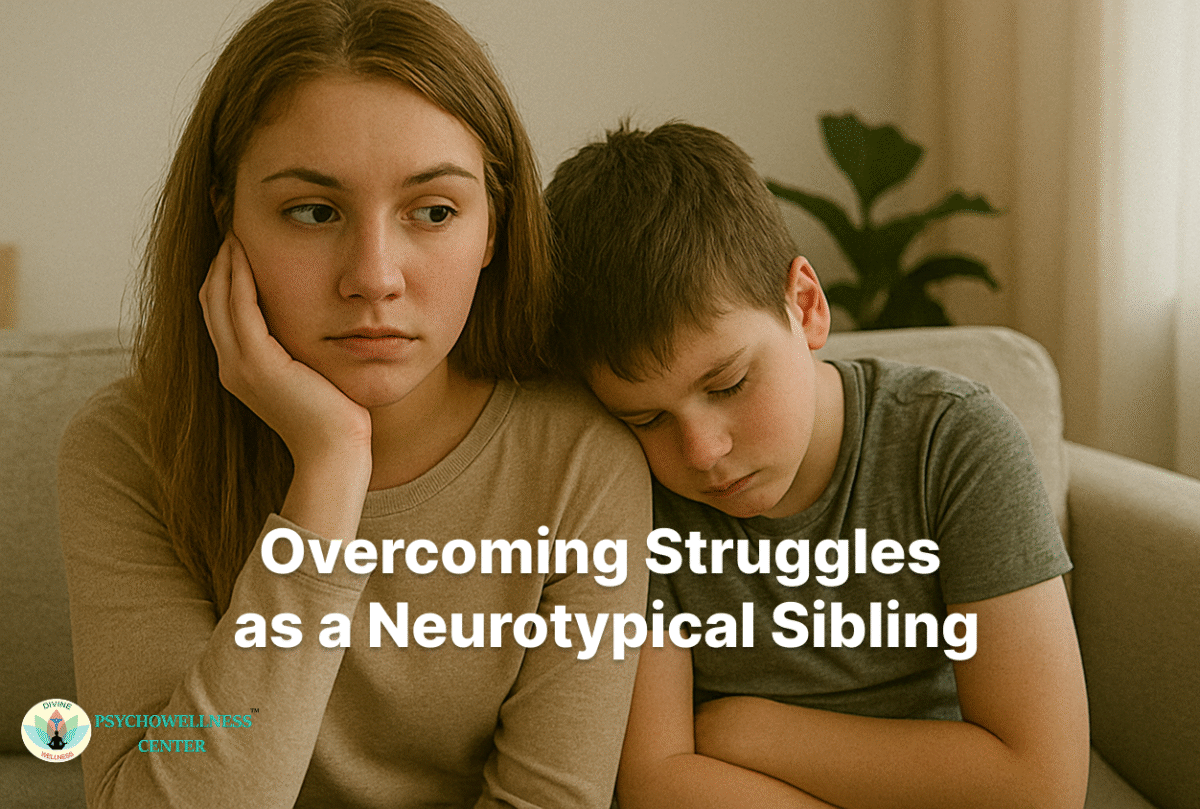Growing up with a sibling who has a neurodevelopmental condition such as Autism Spectrum Disorder (ASD), Attention-Deficit/Hyperactivity Disorder (ADHD), or intellectual disabilities can be a deeply enriching yet emotionally complex experience for neurotypical siblings. These children often walk a tightrope between love, compassion, and confusion, juggling their own developmental needs while navigating family dynamics shaped by caregiving demands, emotional intensity, and medical appointments.
The Unseen Struggles of Neurotypical Siblings
While the focus often remains on the neurodivergent child, neurotypical siblings may feel overshadowed, neglected, or misunderstood. Their struggles, though subtle, are real and can manifest in various ways:
- Emotional Suppression and Guilt: Many neurotypical siblings suppress their own needs or feelings, believing their problems are insignificant in comparison. They might feel guilty for wishing for more attention from their parents or for resenting the disruptions caused by their sibling’s condition (Meyer et al., 2011).
- Caretaking Role at a Young Age: Taking on caregiving responsibilities can foster maturity but may also lead to “parentification,” where children assume adult-like roles prematurely.
- Social Isolation and anxiety: Some neurotypical siblings might avoid inviting friends home due to embarrassment or fear of judgment. This isolation can affect their social competence and self-esteem over time (Petalas et al., 2012).
- Academic Pressure: Feeling the need to compensate or be the “perfect child,” neurotypical siblings may push themselves academically or behaviorally to meet perceived family expectations.
- Ambiguous Identity: Constant comparison or lack of validation may result in difficulty establishing a sense of identity outside of the sibling role.
Resilience Through Adversity
Despite these challenges, many neurotypical siblings grow into empathetic, resilient, and socially aware individuals. Research indicates that these children often develop advanced coping mechanisms, emotional intelligence, and interpersonal sensitivity (Kaminsky & Dewey, 2002).
Some positive outcomes include:
- Heightened Empathy and Tolerance: Constant exposure to neurodiversity can enhance emotional intelligence and increase sensitivity toward others’ needs.
- Adaptability and Patience: Navigating unpredictable situations with a neurodivergent sibling fosters problem-solving skills and flexibility.
- Career and Advocacy Interests: Many neurotypical siblings pursue careers in healthcare, psychology, or advocacy, driven by personal experience and compassion (Hodapp et al., 2010).
Strategies for Coping and Growth
- Open Communication within the Family and Family CounselingParents play a pivotal role in validating the emotions of neurotypical siblings. Open, age-appropriate conversations about the sibling’s diagnosis, expected behaviour, and family dynamics can reduce confusion and feelings of exclusion (Schuntermann, 2007).
- Dedicated One-on-One TimeRegularly spending focused time with the neurotypical sibling without distractions promotes emotional bonding and reassures the child that their needs matter too.
- Sibling Support GroupsConnecting with peers who share similar experiences can normalize their feelings, reduce isolation, and build a community of understanding. Many organizations and therapists offer structured sibling support programs.
- Counselling and Emotional SupportProfessional support can help neurotypical siblings process complex emotions like resentment, guilt, or shame. Healthy coping mechanisms and self-confidence can be developed through therapeutic therapies.
- Encouraging Autonomy and IdentityParents and caregivers should support the neurotypical sibling in exploring interests, hobbies, and goals unrelated to their sibling’s condition. A strong, independent sense of self is fostered by this.
- Teaching Boundary SettingNeurotypical siblings need to learn that it’s okay to say “no” and take care of their own emotional and physical needs. Boundary-setting skills are crucial for their long-term well-being.
Navigating Adulthood: The Long-Term Perspective
The sibling bond doesn’t end in childhood it often transforms into a lifelong dynamic. As parents age, neurotypical siblings may feel increasing responsibility for their neurodivergent sibling. This can evoke concerns about caregiving roles, financial planning, and ethical decisions.
Preparing early legally, emotionally, and practically can ease this transition. Involving neurotypical siblings in family discussions and planning helps them feel empowered rather than burdened.
A Message to Neurotypical Siblings
If you’re a neurotypical sibling navigating this complex path, know that your emotions are valid. You are not selfish for wanting time, space, or recognition. You are allowed to feel conflicted, proud one moment and overwhelmed the next. Your journey, though sometimes overshadowed, is filled with unique strength, depth, and beauty.
Conclusion
Siblings who are neurotypical have a journey of quiet strength. While they may face emotional challenges, they also possess an incredible capacity for empathy, resilience, and advocacy. By acknowledging their experiences, providing appropriate support, and empowering them with resources, families and professionals can ensure that these siblings not only survive, but thrive.
Contributed by Sangeeta Pal, Counselling Psychologist
This blog was posted on 5 July 2025
References
Hodapp, R. M., Urbano, R. C., & Burke, M. M. (2010). Adult siblings of individuals with disabilities: Pathways toward their long-term well-being. Mental Retardation and Developmental Disabilities Research Reviews, 16(2), 136–144. https://doi.org/10.1002/mrdd.20225
Kaminsky, L., & Dewey, D. (2002). Psychosocial adjustment in siblings of children with autism. Journal of Child Psychology and Psychiatry, 43(2), 225–232. https://doi.org/10.1111/1469-7610.00015
Meyer, D. J., Vadasy, P. F., & Fewell, R. R. (2011). Living with a brother or sister with special needs: A book for sibs. University of Washington Press.
Petalas, M. A., Hastings, R. P., Nash, S., Dowey, A., & Reilly, D. (2012). “I like that he always shows who he is”: The perceptions and experiences of siblings with a brother with autism spectrum disorder. International Journal of Disability, Development and Education, 59(4), 303–318. https://doi.org/10.1080/1034912X.2012.723947
Schuntermann, P. (2007). The sibling experience: Growing up with a child who has pervasive developmental disorder or mental retardation. Harvard Review of Psychiatry, 15(3), 93–108. https://doi.org/10.1080/10673220701431220
Tomeny, T. S., Barry, T. D., & Bader, S. H. (2017). Are typically developing siblings of children with autism spectrum disorder at risk for behavioral, emotional, and social maladjustment? Research in Autism Spectrum Disorders, 35, 1–12. https://doi.org/10.1016/j.rasd.2016.11.002

